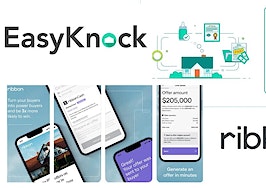In these times, double down — on your skills, on your knowledge, on you. Join us Aug. 8-10 at Inman Connect Las Vegas to lean into the shift and learn from the best. Get your ticket now for the best price.\
We may be worrying too much about technology taking over, according to the results of a new survey conducted by Inman last month focused on the many ways — big and small — automation has encroached on the real estate industry.
Inman sought to gauge how agents, executives and entrepreneurs are harnessing a growing arsenal of digital tools — from CRM platforms to artificial intelligence — in their quest to conquer everything from agent recruitment to document notarization. Multiplying seemingly by the day, these tools now hold sway over nearly every aspect of the real estate industry, for better or worse.
In April, Inman’s data and research arm, Intel, sent a 19-question survey to readers. The survey asked how decision-makers are spending, what tools agents love and loathe, and how prevalent proprietary tech has become as brokerages aim for state-of-the-art stacks. The survey ran April 17-24.
Inman previously dove into the survey’s responses for a report now available exclusively to Intel subscribers. But we also wanted to dive into the survey results to further understand the reality behind the rush to embrace tech, and if for now, technology remains merely a tool, not a sign of industry upheaval.
Here’s how it shook out:
1. Do you consider software an investment or expenditure?
The majority of respondents, 75 percent, see proptech as an investment, meaning there’s the expectation of a return. I find this somewhat low, however, especially when the remaining — 25 percent — consider technology an expense, or simply a cost of doing business.
Stray thoughts: The right technology decision paired with ongoing commitment can change a lot about a company. Ask Henry Ford. While 25 percent isn’t a scary number, it’s enough to make me think we have a longer way to go to make real estate a better experience for buyers and sellers.
2. Have you developed, or would you consider developing, proprietary technology? Or do you prefer off-the-shelf products?
This is a big idea that we’ll flesh out in future surveys. But in this case, there wasn’t much room between the number of people who use off-the-shelf products, 45 percent, and those who use a combination of that and custom-developed solutions at 47 percent. This is odd, given that merely 7.6 percent said they use a custom product. Let’s consider this an outlier for now.

3. Did you hire a real estate-centric vendor to build your web presence?
With 63 percent of those responding say yes, it’s safe to say that firms like Real Estate Webmasters, Luxury Presence, MAXA, Placester and others are getting their value propositions out to the market. Good to see. Close to 37 percent said no, they used an outside firm.
Stray thoughts: Those who choose to work with a vendor outside the space could have a competitive advantage by avoiding similar designs (a lot of real estate sites look alike) and by engaging a design team who can bring in expertise in from outside the industry. There are no standards for real estate websites, and they should be treated as individual reflections of brand. Side does this well.
4. How do you manage your website’s content?
Most responses, but not by much, use an in-house professional versus outsourcing it. The results were 35 percent to 31 percent, respectively. Sixteen percent manage it in ad-hoc fashion with no real organized system (oof) and 18 percent responded “other.”
Stray thoughts: I assume those who said “other” equate site management to asking around the office if anyone knows how to log-in into the content management system. This is also why one agent’s bio will be a thoughtful 400 words and the other merely an outdated glamour shot footnoted by some errant HTML.
5. Is your company independent or affiliated with a major brand?
This was a pretty straightforward attempt to see how technology choices are sorted between brokerage models. A little more than half, 56 percent, are affiliated with a major brand, and 43 percent are independents.
6. If your company is affiliated with a major brand, do you use some or all of the tech stack offered by corporate?
The answer, “I use some of the tech stack” garnered 42 percent of the responses while “I don’t use any of it” earned 13 percent of the vote. “I don’t use the tech stack offered by corporate” received 8 percent and 37 percent weren’t affiliated.

7. If your company is independent, who is making technology decisions for the business?
While 42 percent of respondents to this are out of the running because they’re not independent, we discovered that brokers at independent companies are also in charge of deciding on technology, according to 32 percent of those asked. About 20 percent have a designated professional on-staff, such as an operations lead or CTO handling it and 6 percent use a team of agents for input, a remarkably low number.
Stray thoughts: Adoption might increase significantly when a brokerage has an internal group of agent-users involved in the decision process. I find that 6 percent number eye-opening.
8. On average, how much are you spending per agent on productivity-focused technology, such as transaction management and back-office solutions?
Spending is always fun topic with brokers. One hundred and three respondents, or 40 percent, spend less than $500 per agent. The next tier, $500-$1,000 per agent, garnered 28 percent of the responses. Twenty-three percent of respondents reported spending between $1,001 and $5,000. A scant 8 percent spend more than $5,000 per agent on technology; one can assume these are smaller, independent brokerages.

9. On average, how much are you spending per agent on marketing technologies, such as CRM and lead-generation software? Not including referral payments for closed leads, etc.
Apparently, our respondents are deal-savvy, because 44 percent them spend less than $500 per agent on tools in these categories. Twenty-six percent dole out $500-$1,000 and 19 percent said it’s between $1001 and $5,000. However, close to 10 percent — 9.6 to be precise — budget more than $5,000 per agent on tools to find and sustain clients.
10. Do you provide a single CRM solution or allow agents to purchase independently?
Our survey found that about 46 percent of respondents work at brokerages that provide their agents a single option and 19 percent have the agent decide. We also asked if they do both, to which 34.8 percent answered in the affirmative.
Stray thoughts: The CRM has come a long way, evolving from a simple database of names and numbers to broadly sophisticated marketing engines, and it’s largely the most common software product found in real estate offices nationwide. You don’t have to have one to succeed, but if you are succeeding without one, you can do even better with one.

11. If you provide a CRM, which option best describes agent adoption rates?
Thankfully, 18 percent of our surveyed audience said their adoption was excellent. That’s a better response than I expected. Other metrics were Good at 33 percent, Okay at 26 percent and Poor at 10.5 percent.
Stray thoughts: Adoption is hard, and it’s largely because of the answers to question #10. When so many parties are leveraging different forms of software, the enterprise can’t move forward as one.
12. Of the following, what is the most important consideration when purchasing technology for your brokerage?
Inman Intel wanted to know what kind of factors business leaders considered before writing the check to their new proptech partner. We discovered that it wasn’t primarily for a competitive advantage, as only about 30 percent indicated such. The real reason was to support agents, according to 53 percent of respondents. Recruiting was at bottom of the list at 3 percent, which I have a hard time believing, to be frank. Close to 7 percent use cost as a determining factor (that I can believe) and 7.5 cited “other” reasons.
Stray thoughts: The issue I have with supporting agents first, or at least leading with that pitch, is that it ignores the greater good of the business itself. It’s one reason why the industry is slow to change. It’s endlessly trying to serve offices of individuals, as opposed to a uniform team centered on a single cause.
I’m not advocating for ignoring the needs of agents, I’m simply saying that approach leads to disjointed operations and is why in many cases culture is almost impossible to build within the industry. Inman reports on major agents or teams switching sides almost every day. It doesn’t have to be this way.

13. Do you have a single, end-to-end technology solution (lead gen through transaction management) or a tech-stack of individual products?
The tech-stack remains the favored form of company-wide software provision, according to 49 percent of our respondents. Another 32 percent use a single end-to-end software solution. I find this a healthy number, and one that may grow if we asked in another 12 months.
Nineteen percent responded with “other” to this question.
Stray thoughts: While the open-ecosystem, or finding the best solution for each business activity, is easier for brokers and there’s more variety for agents, there are a number of drawbacks. It requires a wide array of training, for starters. Agents will be pulled into seminars and help sessions at different times and rates, unless carefully managed by the office manager or broker. There’s not the same level of internal collaboration or camaraderie around a common goal, either, because the varying adoption rates.
It’s also more difficult to create a consistent workflow between systems. And as contracts ebb and flow between systems, brokers are burdened with managing costs across a range of dates and user license volume. They also face the challenge of absorbing disparate terms and conditions agreements.

14. At what kind of business do you operate or work?
Clearly, the vast majority, 95 percent, or respondents were employed by a real estate brokerage, either an independent or with a major franchise. To a non-consequential degree, the remainder of respondents worked at marketing companies, marketing or public relations firms, in the mortgage, title or escrow industries and technology firms.
15. What is your role at your company?
Naturally, a respondent’s role is crucial to how they overlap with proptech use and decisions each day. Ultimately, 36 percent of respondents said they were agents, followed by 21 percent identifying as broker-in-charge. Thirteen and 11 percent, respectively, were CEOs and co-brokers. Just under 7 percent of respondents were presidents and 10 percent marked “other.” The smallest percentage of respondents identified as administrative staff.
16. If you work at a brokerage, how many agents do you have?
To this survey question, 48 percent said they worked in a real estate company with more than 50 employees. A few less, 42 percent, worked with between one and 25 folks and 10 percent had co-workers numbering between 26 and 50.
17. What tactics have you found to be successful when needing to increase agents’ engagement with technology you’ve implemented?
Intel was looking for free response answers here. So, ideas and off-the-cuff business tactics that respondents use to keep their teams connected to the tools designed to help them succeed. The responses were diverse, so here are some that we felt stood out.
- Finding a “product champion” in the office to help engage other agents
- Show them “How Earnings is Through Technology”
- The end result of them not achieving their financial goals drives them to adopt what we’ve implemented
- They are Dinosaurs and do not want to learn new ways
- Leads are provided only in company CRM
- Short videos on new features, one-on-one meetings. Agents are in so many different spots in their technology journey it is hard to have “tech classes” that get attendance
- Smarter, younger agents … old timers don’t like to change
- Automation: Use technology to automate administrative tasks, such as scheduling appointments or creating reports. This can free up time for Realtors to focus on more profitable tasks, while also improving their overall productivity and job satisfaction
- Testimonials from peer agents that have found success with it, training and incentives
- Demand updates on progress
- Hired a direct trainer for our tech stack and incorporated it into all training environments
18. What topic/category of proptech excites you the most?
This question, also free response, evoked a lot of enticing comments on what the industry is looking forward to. In general, artificial intelligence and automation led the responses, and quite a few are excited about currently evolving technologies, such as floor plans and immersive tours.
- (Response edited for brevity) I would love to see a true end-to-end solution, issued to all Realtors by NAR, at a fair price. It is exhausting having so many different softwares that only do 75 percent of what’s needed. It is crazy the amount of extra work that is required by agents in a tech-heavy world in 2023. NAR should do so much better for it’s members
- AI and lead generation/conversion tech
- I don’t get excited about proptech
- Anything that takes follow-up out of their (individual agent) control. In other words, intelligent automated follow-up system
- Anything that doesn’t cost us more money and actually helps productivity. I’m still looking for this solution after 17 years
- Floor plan and 3D renderings
- One of the most thrilling advancements is the virtual and augmented reality (VR/AR) technology. VR/AR allows Realtors to offer customers immersive and interactive tours of properties, saving time and presenting a more interesting experience
- My son is in proptech, and I’m pumped about the tech that will allow new homes to be built more efficiently. We need new construction
- Big data AI and blockchain smart contracts
- Anything disruptive that reduces friction
- More end-2-end tech that is brokerage-focused (the majority are agent or team-focused) and bring down the cost for brokerages; more options for review capture for brokerages
19. What topic/category of proptech would you like to see forgotten about/de-emphasized?
Our last question delved into what readers may not be psyched about anymore, or simply sick of hearing about. A few didn’t hold back.
- Lead gen and parasitic companies that hand back leads that would have naturally come to me
- Command for KW it is too far behind the tech and should really move to a tech stack
- Realtor.com, Zillow, Orchard, Opendoor and other tech that MLS feeds out too
- Zillow and Realtor.com
- Broker-side monetization of lead gen. Everything is very agent-centric but a broker that can scale it can provide more benefit to the agents. However, most lead gen companies make it hard for the broker to make anything from the sale
- Majority of marketing software. The only marketing that works is video; each agent must personalize it. It can’t be cookie-cutter marketing any longer
- AI
- AI. It’s quickly gotten over-hyped and diluted. There are a lot of products using the term “AI” very loosely.
- Anything that asks a customer if they plan to move
- Internet leads have become a dying category. Everyone has the promise of the biggest and best, but no one really delivers anymore. They are focused on quantity of leads as a promise rather than quality
- Automatically offering social media posts is useless. Just keep it to the deal management process is all we need
- Faxing
I found faxing to be an interesting choice. I can only assume that somewhere, likely Florida, a few brokerages still have clients who like to watch paper get pulled into a clunky modem the size of a dorm refrigerator while ignoring the scanner in your pocket that can accomplish the same feat in under 30 seconds. Whatever gets you to closing, I guess.
That’s a wrap on Inman’s first proptech survey. We learned a few things for our next one, mainly about how we word questions and what categories need deeper separation. We’ll get there. Thank you to everyone who took part.













